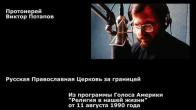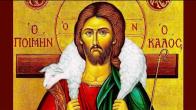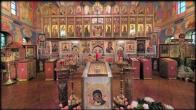You are here
St. Euthymius, monk of Suzdal
April 1/14
St. Euthymius was born into a family of pious and prosperous residents of Suzdal, in the parish of the Holy Myrrh-bearing Women. This church, in which he was baptized, remained in existence until recently. He received a church education which was normal for all children for that time, but he distinguished himself from all the children by his prayerfulness, self absorption, and reserve. In church, which he attended often, both because his parents desired it and because he himself was drawn to it, he always stood in a dark corner, so that no one would notice him or interfere with him as he prayed and listened to the service. He was still young and the words of the apostle were imprinted into his soul: "Brethren, be not children in understanding: how be it in malice be ye children, but in understanding be men." (I Cor. 14:20) Another time his thoughts stopped on the words of the Gospel: "For whosoever will save his life shall lose it ... For what shall it profit a man, if he shall gain the whole world, and lose his own soul? Or what shall a man give in exchange for his soul?" (Mark 8:35-37) The youth became engrossed in the lives of the holy ones who were pleasing to God, and he prayed to God to send him a teacher on the way to fulfilling the commandments of the Gospels.
And his prayer was heard. Not far from Nizhni-Novgorod a hermit settled, the monk Dionysius (+June 26). He dug out a cave in the mountainous **** of the Volga and started to live a spiritual life. People started to come to him for advice and prayer, and soon pupils started to other around him. Thus the Perchersky Holy Ascension monastery came into being. The future saint Euthymius was among those who came to him. Falling down at his feet, the youth was so moved that he could not speak. St. Dionysius lifted him up, calmed him down and brought him into his cell for a spiritual conversation. Then he summoned the brotherhood and tonsured him with the name Euthymius. Then Euthymius's heart was filled with a great joy, and he passionately thanked God: "I thank thee, Lord Jesus Christ, my God'--he prayed--"for allowing me, wicked and unworthy, to received the salvation I desire . . ." He had a great example in the person of his superior, who always preserved his humility, friendliness and peacefulness amidst the unending monastic labors.
The young monk did not spare himself: by day he submissively fulfilled the obedience that was imposed on him, while praying constantly; by night he went off to his cave where he prayed tearfully, sometimes not closing his eyes. If he did fall asleep, it was for a very short time and always on the floor. Fasting brought him pleasure; he would have liked to eat every two or three days. But St. Dionysii blessed him to share the monastic meals: only not to eat until he was full. St. Euthymius obeyed as always without protest; he ate only enough so that he would not die of hunger, and drank only when he was very thirsty, and then only very little-, thus he concealed his abstinence from the brothers. But this was not enough for him: he started to wear iron chains. Undergoing a heavy torture in the refectory, he said to himself 'Euthymius, bear this fire, for by this fire you will be able to escape that fire.' Thus many years went by. When he was 36 years old, Prince Boris of Suzdal wished to build a monastery in the city of Suzdal, and St. Dionysius chose his best student, St. Euthymius, for this task (Nizhni-Novgorod was in the principality of Suzdal). With bitter tears St. Euthymius bid farewell to his staretz with whom he had hoped to remain until the very end. On the way he founded a monastery near the city of Gorokhovetz: recently this was the parish church where his walking staff was preserved.
In Suzdal Prince Boris and Archbishop John (+Sept. 15) met him with love and joy. Very quickly a place was chosen for the future monastery. There St. Euthymius founded a residential monastery in the name of the Transfiguration of the Lord which is known to this day as Spaso-Euthymius Monastery of the Saviour. Under his wise guidance and ardent supervision, this became a model monastery. Contemporaries speak of the strict order, piety and industriousness which reigned within it. St. Euthymius served during hard times: Russia was suffering at that time not only from the Tatar invasion and princely wars, but also from drought, crop failures and plagues which caused the death of the great prince Simeon of Moscow in 1353. Finally, upon the death of Metropolitan Alexis (+Feb. 12), there was a disturbance in the church. Even Archbishop Dionysius of Suzdal, the former teacher of St. Euthymius, was drawn into it. The saint himself did not take heart of worldly matters. Above all he was a monk, but all these events greatly saddened him: his native land, Suzdal, was at war with Moscow.
St. Euthymius, along with St. Dimitri of Prilusk (+Feb. 11) and some other monks, is called "an interlocutor of St. Sergius of Radonezh": he was his friend, and visited him [St. Sergius] more than once. St. Euthymius's monastery was, as God had arranged it, near a large city, at the crossing of two roads. The unfortunate, the poor, the homeless, widows, orphans, the persecuted and the abused, wandered in crowds about Russia, and its gates were always open wide for a of them. Saddened by the people's misfortunes, St. Euthymius helped those who were suffering and encouraged them with his words and prayers. For their sake, he did not spare the resources of the monastery; his generosity depleted its supplies. More than once he exposed untruths, with one word he saved those who had been wrongly condemned, and redeemed those who were in debt. He did not like people to know about his good works. When he was asked which was the highest virtue, he answered: "The one that is practiced in secret."
Before his death, he bid a fatherly farewell to the brotherhood, blessing, kissing and caressing each one. Everyone was robbing. He foretold that the monastery would flourish if the brothers would love each other. When he gave up his spirit to the Lord, his cell was filled with fragrance and his face was more bright then when he was alive. He died at the age of 88 on April 1, 1404. They buried him in a grave which he had dug with his own hands. During his life he was a miracle-worker, hearings from his holy relies did not cease when he died. In 1507 they were discovered not to have decayed and St. Euthymius was canonized. Prince Dimitri Pozharsky was from Suzdal. Before his campaign he always prayed at the saint's shrine and he ascribed his victory to the saint's intervention. Prince Pozharsky was buried in 1642 in the Spaso-Euthymius Monastery, in his ancestral tomb. The women's burial vault of the Pozharsky princesses was in the Holy Protection convent in Suzdal founded by St. Euthymius.
A New Relic in our Cathedral
A Letter From Novosibirsk (1988)
In 1988 Fr. Victor received a hand delivered letter from a priest in the Soviet Union.
"I am taking this opportunity, and I am very happy, to greet you and your matushka. You remember, we met during the millennium celebration in Moscow. Now I am at home in Novosibirsk. I still haven't found a job, but I think I will find one soon. Parish life here is special and complicated. At any moment one can be deprived of one's parish and I have suffered for active church activity. The commissioner won't let us register. I listen to your radio broadcast every week. Many people in Siberia listen to you and know you. They are grateful for the information. I am sending you and your bishop the holy relics of Saint Euthemius, the miracle-worker of Suzdal. I have given away all of your little icons--we need more. We need some holy, myrrh from the Iveron icon. Please, if you can, send literature: The Law of God, a Bible for children, and something more. You can send it if someone is going to the capital, and from there it can be sent to me by mail. Perhaps there is another way? I wish you could help! Blessings in your labors! I ask your holy prayers. From Rev. Boris. With love in Christ."
PARISH LIFE
Address of our Cathedral
Subscribe to our mailing list
While all the materials on this site are copyrighted, you may use them freely as long as you treat them
with respect and provide attribution on the Russian Orthodox Cathedral of St.John the Baptist of Washington DC.









